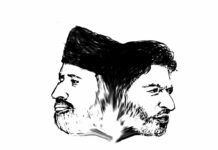Javeed Ahmad
Kashmir is a long-pending dispute – the assertion found its way into President Obama’s recent public pronouncements in New Delhi. The statement lit-up the pro-freedom camp and the people here in general. We are yet to come out of, what can be called, statementality. We, at times, celebrate symbolism even at the cost of substance.
Such statements have, and will, keep our reveries alive, as long as, we stay in the political wonderland of our imagination.
However, credit must be given where it is due.
The clear reiteration of US position despite Indian diplomatic and public haggling was indicative of the real-politick push that came from Kashmir, which remained on toes politically for the last five months.
Internationally, one can say, Kashmir has slowly but steadily begun to graduate from the newspapers and magazines to credible and powerful think tanks to real policy circles to even policy formulations of the international community.
Kashmir struggle, largely non-violent, seems to move towards a phase where actual political calculations may be considered about its resolution.
Kashmir is somehow getting positioned as a small cog in the broader institutional reforms of world bodies like United Nations Security Council which India desperately aspires to join as a permanent member.
In India, it has already breached the “national interest wall” of Indian rhetoric and broken with some success, the public consensus on “integral part theory”. Kashmir’s indigenous narrative is pushing its way slowly through the melee of different political discourses in India’s mainstream.
Locally, under public pressure generated during last five months, which saw colossal sacrifices rendered by Kashmiris in terms of young lives and business worth billions; Pro-India parties have been forced towards the centre of the political divide with everyone crying hoarse for resolution of Kashmir.
However, it must be understood that people cannot defeat power of a state by force but through moral and political courage, which does stay with Kashmiris. For, Kashmiri people ask – and struggle for – just peace and resolution through self-determination.
These demands are universal and must not be approached in a parochial/extremist way both in political and cultural senses. People of J&K aspire to progress, develop and prosper like any other nation in the world.
Indian state seems to be acknowledging, albeit subtly, the gravity of the dispute. One hopes it soon realizes that Kashmir resolution is an integral part of a larger resolution that most of India’s problems are keenly waiting for.
Bottom-line: All this makes a sketch of current discourse on Kashmir which can be invested with political substance only by the people of J&K themselves. Are we equipped enough to meet the challenge?
PS: Public mobilization remains the most important tool of people’s resistance. But the last six months must serve a lesson, learnt painfully and at a huge price, to the pro-freedom leadership to realize the flaws and faults in the methods of such mobilization.
The coming times demand rigorous thinking on part of all those who claim to lead the struggle to comprehend, reflect and formulate political responses rooted in people’s wishes as well as their welfare.















